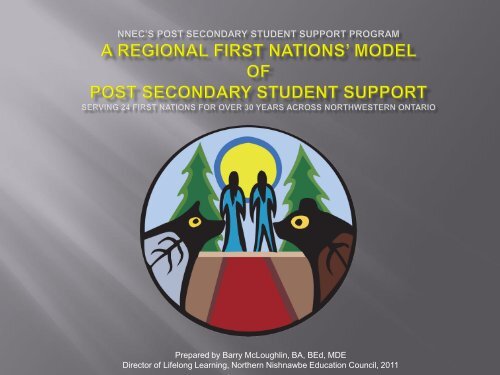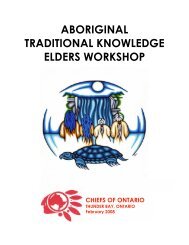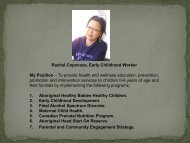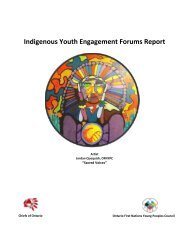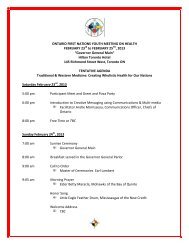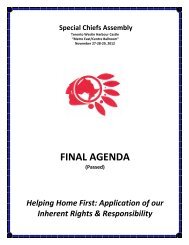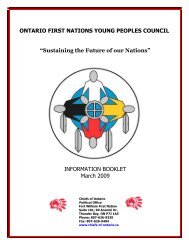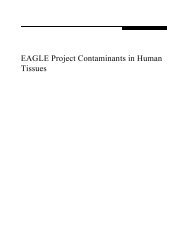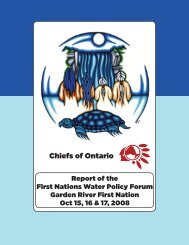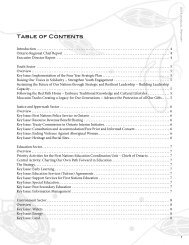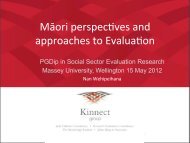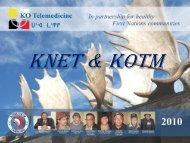Post Secondary Student Support Program - Chiefs of Ontario
Post Secondary Student Support Program - Chiefs of Ontario
Post Secondary Student Support Program - Chiefs of Ontario
You also want an ePaper? Increase the reach of your titles
YUMPU automatically turns print PDFs into web optimized ePapers that Google loves.
Prepared by Barry McLoughlin, BA, BEd, MDEDirector <strong>of</strong> Lifelong Learning, Northern Nishnawbe Education Council, 2011
PSSSPNNEC’s <strong>Post</strong> <strong>Secondary</strong> <strong>Student</strong> <strong>Support</strong> <strong>Program</strong>provides financial, social and academic assistance toeligible students from area First Nations. NNEC sponsorsand supports eligible applicants accepted into accreditedcollege and university programs.
Northern Nishnawbe Education Council iscommitted to supporting a First Nations’education system that enforces academicstandards, reinforces cultural identity, andenables learners to contribute withconfidence to the well-being <strong>of</strong> the globalcommunity. NNEC <strong>Chiefs</strong> Resolution, AGM, October, 21 2009
Our vision focuses on healthy sustainablecommunities. We foresee a future wherethe results <strong>of</strong> our efforts create a positiveinfluence in the lives <strong>of</strong> children and theirparents. This vision sees a world in whichFirst Nations people succeed without loss<strong>of</strong> their identity and have the courage tochange their world according to theirvalues. NNEC <strong>Chiefs</strong> Resolution, AGM, October, 21 2009
Aboriginal Affairs & Northern Development CanadaAANDC is considering <strong>Post</strong> <strong>Secondary</strong> <strong>Student</strong> <strong>Support</strong> <strong>Program</strong>Policy options for 2013 that include:- converting PSSSP grants into repayable loans toincrease enrolment- devolving the program to a 3 rd party for the administration <strong>of</strong>the PSSSP- replacing PSSSP with “Aboriginal” <strong>Post</strong>- <strong>Secondary</strong> EducationSavings AccountsThese Government <strong>of</strong> Canada options further threatenpost secondary access and education opportunities forremote “First Nations” members across Northwestern<strong>Ontario</strong>.
<strong>Program</strong> Funding• Currently, multiple factors contribute to the lack <strong>of</strong> PSSSP fundsimpeding the sponsorship <strong>of</strong> NNEC students:• - 1998 - Government <strong>of</strong> Canada - 2% cap on PSSSP funding• - rising tuition, travel, course supply, and standard <strong>of</strong> living costs• - increased number <strong>of</strong> Grade 12 graduates• - increased number <strong>of</strong> adults returning to school• - increased number <strong>of</strong> part-time students• - 2010 - Bill C-3 - new pool <strong>of</strong> students• - expansion <strong>of</strong> accredited community-based programs• NNEC has clearly defined program levels and eligibility criteria toguide the distribution <strong>of</strong> post secondary dollars for 24 First Nations.
Eligibility LevelsPSSSP sponsorship is based on the following eligibility levels:• Priority 1• Continuing successful NNEC students• 1 st time Grade 12 high school graduates• Priority 2• Continuing successful self-funded students• Continuing successful external party funded students• Priority 3• 1 st time Grade 12 equivalency (course) students Sept 2011 Intake Threshold• Working pr<strong>of</strong>essional Spring/Summer students• Priority 4• *2 nd chance Gr. 12 high school graduates• 1 st time Gr. 12 equivalency (challenge) mature students• Priority 5• *2 nd chance Gr.12 equivalency (course) students Sept 2010 Intake Threshold• Priority 6• *2 nd chance Gr. 12 equivalency (challenge) students• Priority 7• 3 rd chance students who are out <strong>of</strong> school for a minimum <strong>of</strong> five years••* 2nd chance students must be out <strong>of</strong> school for at least the remainder <strong>of</strong> the academic year plus oneadditional year, to be considered for funding.
September 2011 – <strong>Student</strong> IntakeProjected tuition, travel, materials, and living allowance costspermitted the approval <strong>of</strong> all PRIORITY #1 students by mid-August, 2011:- 331 total students- 134 FT university students- 141 FT college students- 56 PT college and university studentsA select few self-funded PRIORITY #2 students have since beenapproved due to FT student deferrals and withdrawals withoutpenalty.
John GreggNative Language Instructor Diploma, 2011Lakehead UniversityKasabonika First Nation
First NationsCollegeAccessCertificates Diplomas UniversityAccessDiplomas Bachelors Masters DoctoratesBearskin Lake 12 3 4 2 1 1 1Cat Lake 3 1 1 1Deer Lake 2 1 1Fort Severn 3 1 1 1Kasabonika 7 1 1 1 4Keewaywin 5 2 1 2Kingfisher Lake 5 1 3 1KI 5 1 1 1 2Lac Seul 14 1 1 5 4 2 1Mishkeegogamang 6 1 3 1 1Muskrat Dam 1 1North Caribou Lake 2 2North Spirit Lake 1 1Pikangikum 2 2Sachigo Lake 7 1 1 1 1 3Sandy Lake 10 2 2 3 1 2Saugeen 1 1Wunnumin Lake 4 1 1 2TOTALS 90 14 9 24 9 10 19 4 1
Archie MekanakBachelor <strong>of</strong> Arts, 2011Lakehead UniversityWunnumin Lake First NationAlec OombashBachelor <strong>of</strong> Arts, 2011Lakehead UniversityCat Lake First Nation
Mary LaurMaster <strong>of</strong> Arts, 2011Laurentian UniversityMishkeegogamang First Nation
First NationsCollegeAccessCertificate Diploma UniversityAccessCertificate Diploma Bachelors Law Masters DoctorateBearskin Lake 7 1 2 2 2Cat Lake 1 1Deer Lake 3 2 1Fort Severn 3 3Kasabonika 2 2Keewaywin 2 1 1Kingfisher Lake 5 1 4KI 4 1 1 1 1Lac Seul 19 6 3 2 1 7McDowell Lake 1 1Mishkeegogamang 3 3Muskrat Dam 3 1 1 1North Caribou 11 1 5 3 2North Spirit Lake 1 1Pikangikum 1 1Sachigo Lake 10 1 1 1 1 6Sandy Lake 16 2 2 1 6 2 2 1Saugeen 1 1Wunnumin Lake 1 1Wapekeka 1 1TOTALS 95 4 7 23 4 21 9 22 1 3 1
Carrie Lynn TroutNative Child and Family Services Diploma, 2010Confederation CollegeLac Seul First Nation
It is important that leaders, parents, guardiansand students understand that:- policies are developed to ensure theequitable treatment <strong>of</strong> all students- policies are intended to secure the safety andsecurity <strong>of</strong> all students- policies are applied to ensure the integrityand success <strong>of</strong> NNEC programs
It is important that students understand theirrights:• - to the privacy <strong>of</strong> information• - to be informed <strong>of</strong> PSSSP policies andprocedures• - to be treated respectfully by NNEC staff andstudents
• It is important that students understand theirrights:• - to discuss academic circumstances, withoutfear <strong>of</strong> reprisal• - to have PSSSP issues resolved in a fair,equitable, and timely manner• - to file a complaint or appeal without fear <strong>of</strong>reprisal
It is important that students understand theirresponsibilities:• - to be informed <strong>of</strong> PSSSP policies andprocedures• - to comply with program policies andprocedures• - to treat staff and students with respect- to provide program/course documentation onschedule
• It is important that students understand theirresponsibilities:• - to complete all course work, on schedule• - to attend all required classes and tutorials• - to arrive on time and remain for the duration<strong>of</strong> the lesson/tutorial• - to maintain a minimum 2.0 Grade PointAverage (GPA)
• It is important that students understand theirresponsibilities:• - to consult with NNEC prior to withdrawalfrom a course/program• - to refrain from verbal or physical abuse <strong>of</strong>NNEC staff or students• - to not enter an NNEC building under theinfluence <strong>of</strong> alcohol/ illicit drugs
• <strong>Student</strong> <strong>Support</strong> Services• NNEC’s <strong>Post</strong> <strong>Secondary</strong> <strong>Student</strong> <strong>Support</strong> <strong>Program</strong> <strong>of</strong>fers counselling andfinancial support services to students from across the region.• Sioux Lookout Unit• - Director• - 2 Counsellors• - 1 Clerk• Thunder Bay Unit• - 1 Head Counsellor• - 1 Counsellor• - 1 Clerk•
Nelson Agustin, BA, BEdCounsellor, Sioux LookoutThomas Cromarty, JDLaw - Osgoode Hall, 2009Sachigo Lake First NationTerrilynn Capay Memorial Award Recipient 2009Leona Scanlon, BA, BEdHead Counsellor, Thunder Bay
• Counselling <strong>Support</strong>• Services include, but are not limited to:• - orientation to urban services, including hospital/dental/optical,transportation, recreation, churches, shopping• - guidance related to college/university programs, admissionrequirements, institutional expectations, campus life, andhousing• - assistance with enrolling children in day care and schools• - assistance with budgeting and banking procedures• - guidance on academic and financial responsibilities and legalrights• - referral to appropriate agencies and pr<strong>of</strong>essionals for support• - academic counselling, encouragement, and assistance withtutoring• - career counselling
• Financial <strong>Support</strong>• Financial support for students includes:Tuition Fees• Partial or full tuition fees are paid for full time and part timestudents who are accepted into accredited Canadian andinternational programs <strong>of</strong> study. Tuition fees are calculated atcomparable rates to <strong>Ontario</strong> post secondary institutions.•
International StudiesA student may enroll in an international program <strong>of</strong> study providedthe minimum academic prerequisites are comparable, the number<strong>of</strong> credit hours are equivalent (within 10 per cent) and the programcredits are transferable to a Canadian institution.• Tuition payments are made directly to Canadian institutionsupon receipt <strong>of</strong> an invoice. International tuition payments arereimbursed directly to students upon receipt <strong>of</strong> an invoice.
• <strong>Student</strong> Fees• Full time student fees are paid for by NNEC including, butnot limited to:• - mandatory registration fees• - student activity fees- testing fees- transcript related fees- pr<strong>of</strong>essional certification fees- examination fees
Books and Supplies• NNEC will provide funding for books and supplies as required bythe post secondary institution for a full time and part time student.
Travel• Full time students who must move away from a permanent place <strong>of</strong>residence to pursue post secondary studies will receive financial aid.• Modular students may be funded to travel on a seasonal basis.• Only full time students receive financial aid for approveddependents.
Travel AssistanceTravel assistance supports the required costs <strong>of</strong> return transportationfrom the student’s permanent place <strong>of</strong> residence.Financial aid is based on the most economically appropriate means <strong>of</strong>transportation and subject to NNEC discretion.<strong>Student</strong>s must contact their counsellors at least 3 weeks prior todeparture to arrange travel.Travel dollars may not be spent by a student who elects not to travel.
Living Expenses• A monthly living allowance is provided to full time andworking pr<strong>of</strong>essional students based on available funding toassist with the costs <strong>of</strong> living - shelter, utilities, food andclothing.• A daily living allowance is provided to modular students toassist with accommodations and meals.•
Application Review Process• Education funding applications are reviewed by a panel <strong>of</strong>counsellors in consult with the Director <strong>of</strong> Lifelong Learning.Reviews are conducted in accordance with criteria prescribed bythe NNEC Board <strong>of</strong> Directors.• Applications are reviewed on the basis <strong>of</strong>:• - eligibility• - available funds• - timeliness <strong>of</strong> applications• - student success history• - academic readiness• - accreditation status <strong>of</strong> the post secondary institution•
Application Review Process• Approved and denied PSSSP applicants are advised <strong>of</strong> theirstatus and informed <strong>of</strong> appropriate next steps.Appeals Process• A wait-listed or denied applicant who believes policy was not fairlyapplied may appeal the decision in writing to the Director <strong>of</strong>Lifelong Learning.• The individual case will be reviewed in consultation with PSSSPstaff and the applicant. A final letter to the applicant indicatingNNEC’s final decision concerning the case will be sent within 15working days.
<strong>Program</strong> Levels• To be eligible for funding assistance, candidates must be accepted into acollege, university, or educational program that grants an accreditedcertificate, diploma, or degree. Credits must be transferable.• <strong>Post</strong> secondary levels <strong>of</strong> study funded by NNEC include:• Level 0 College access / university access programs (1 year <strong>of</strong> full timefunding)Level 1College certificate / diploma programs (1 – 3 years <strong>of</strong> full timefunding)• Level 2 University diploma / undergraduate degree programs (3 – 5years <strong>of</strong> full time funding)• Level 3 University graduate degree (2 – 3 years <strong>of</strong> full time funding)• Level 4 University post graduate degree (1 year <strong>of</strong> full time funding andpartial support to completion)
<strong>Program</strong> Levels<strong>Student</strong>s may continue to receive funding assistance if graduatingfrom:- an access program to a college or university program- a college to a university program- an undergraduate to a graduate program- a graduate to a post graduate program<strong>Student</strong>s are expected to complete the program in the normal timeframe. Eligible students may receive support funding for one fulltime program per year and for one program at each level.
EligibilityPriority 1 applicants are most <strong>of</strong>ten approved for funding withoutdelay. NNEC encourages candidates who are declined funding tocommence or continue through self-funded or external means.<strong>Student</strong>s may then earn Priority 2 continuing successfulstudent status to improve the likelihood <strong>of</strong> sponsorship.<strong>Student</strong>s may receive one additional year <strong>of</strong> support tocomplete a program provided: the program can be completedwithin the additional year, the student demonstrates adequateprogress, and the counsellor recommends the student for support.••
Governance• <strong>Post</strong> <strong>Secondary</strong> funding assistance is an investment in the future<strong>of</strong> First Nations. Pr<strong>of</strong>essionals are needed across the spectrum toadvance governance at local, regional, provincial, national, andinternational levels.•• <strong>Post</strong> secondary students are expected to conduct themselves asresponsible adults, and demonstrate:• - self-initiative and organization• - respect and responsibility• - diligence and reliability
<strong>Student</strong> Responsibilities• <strong>Student</strong>s are accountable for their actions. Inappropriateconduct may result in failure or termination <strong>of</strong> sponsorship.New students sign a Charter <strong>of</strong> <strong>Student</strong> Rights andResponsibilities acknowledging their contractual rights andresponsibilities with Northern Nishnawbe Education Council.It is the responsibility <strong>of</strong> students and staff to ensure that limitedfunds are expended in the best interests <strong>of</strong> participating FirstNations.•••
• “I keep having to remind myself,yes, I am Dr. Cutfeet now.”• I keeChief Donny Morris, Kitchenuhmaykoosib Inninuwug First NationBarry McLoughlin, Director <strong>of</strong> Lifelong Learning, NNEC, Sioux LookoutLeona Scanlon, Head <strong>Post</strong> <strong>Secondary</strong> Counsellor, NNEC, Thunder BayJames Daniel Cutfeet, M.D., Lakehead University – Northern <strong>Ontario</strong> School <strong>of</strong> MedicineKitchenuhmaykoosib Inninuwug First Nation Terrilynn Capay Memorial Award Recipient 2010
• Counsellor Intervention Process• Step One• Upon becoming aware <strong>of</strong> a problem, the counsellor will:• - discuss the situation• - provide assistance as possible• - clarify NNEC expectations• - assist in planning for change• - arrange for additional help such as tutoring• - refer the student, if appropriate, to an agency foradditional help
Step Two• If the problem situation persists (i.e. repeated truancy) or there is amore serious incident (i.e. verbal abuse), the counsellor willconsult with his or her supervisor and an appropriate course <strong>of</strong>action will be determined.• Depending on the degree <strong>of</strong> misconduct, the following may occur:• - further counselling with ongoing monitoring• - referral to an external agency• - being placed on academic probation- termination <strong>of</strong> financial sponsorship- a combination <strong>of</strong> the above
• Confidential File• NNEC retains an up to date confidential file for each studentsponsored by the organization. <strong>Student</strong> files include, but are notlimited to, completed copies <strong>of</strong>:• - acceptance letters• - high school transcripts• - high school diplomas• - high school equivalency transcripts• - high school equivalency certificates• - post secondary school transcripts• - post secondary school certificates• - post secondary school diplomas• - post secondary school degrees
• Confidential File• <strong>Student</strong> files include:• - copies <strong>of</strong> status cards• - letters <strong>of</strong> support• - educational assistance forms• - release <strong>of</strong> information forms• - charters <strong>of</strong> students rights and responsibilities• - progress reports• - letters <strong>of</strong> appeal• - student incident reports• - other relevant information
• Confidential File• <strong>Student</strong>s sign a Consent for Release <strong>of</strong> Information that authorizesPSSSP staff to access their files and post secondary institutions toshare information.<strong>Student</strong> consent grants NNEC the right to release vital informationto the NNEC Board approved auditor and affiliated Government <strong>of</strong>Canada <strong>of</strong>ficials.• Financial information may be released from the date <strong>of</strong>sponsorship through seven years after completion <strong>of</strong> the student’spost secondary studies.• <strong>Student</strong>s may access their files upon request.
Anita Olsen Harper, PhDDoctorate <strong>of</strong> Philosophy – EducationUniversity <strong>of</strong> Ottawa, 2011Lac Seul First NationTerrilynn Capay Memorial Award Recipient 2011. . . to be presented by Chief Clifford Bullat the October 2011Annual General Meeting <strong>of</strong> <strong>Chiefs</strong>to recognize NNEC’s most prestigious graduate
Northern Nishnawbe Education Council <strong>of</strong>fers aREGIONAL FIRST NATIONS’ MODEL OF POST SECONDARY STUDENT SUPPORTThe NNEC Board <strong>of</strong> Directors endorses continuedADMINISTRATION BY REGIONAL FIRST NATIONS’ EDUCATION ORGANIZATIONSas the viable First Nations controlled option in PSSSP administration for 2013Board <strong>of</strong> Directors Resolution 2009PSSSP LogoDesigned by Kevin BelmoreThe logo features a male and female standing side by side facing a bright and whole future. They walk thered earth path <strong>of</strong> lifelong learning amidst the boreal forest. The knowledge seeking wolf andintrospective bear serve as spirit guides along the journey to self-actualization.For further information contact:Barry McLoughlinDirector <strong>of</strong> Lifelong LearningNorthern Nishnawbe Education Councilbmcloughlin@nnec.on.ca


